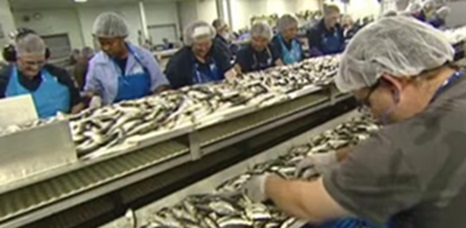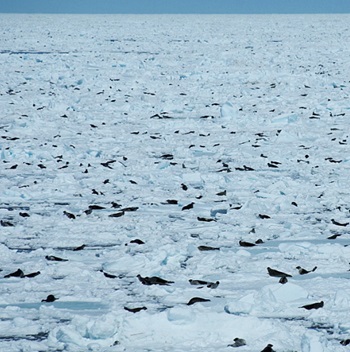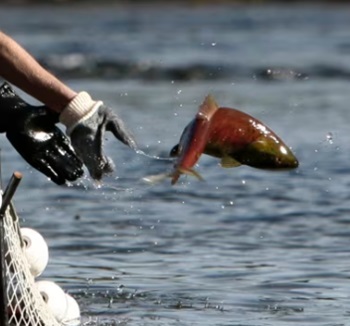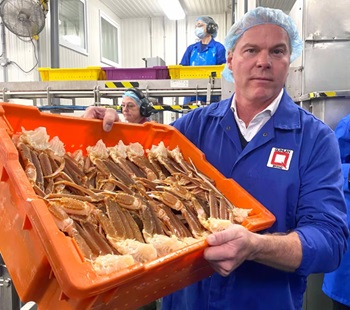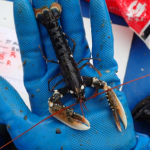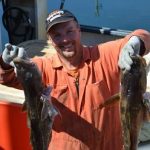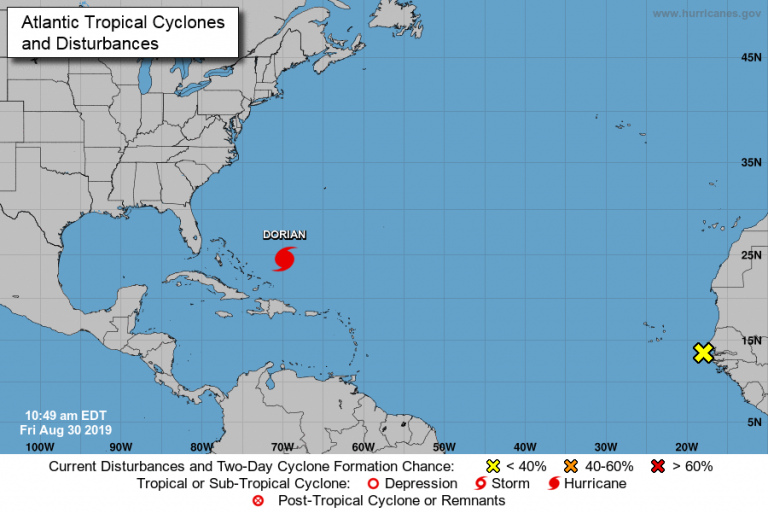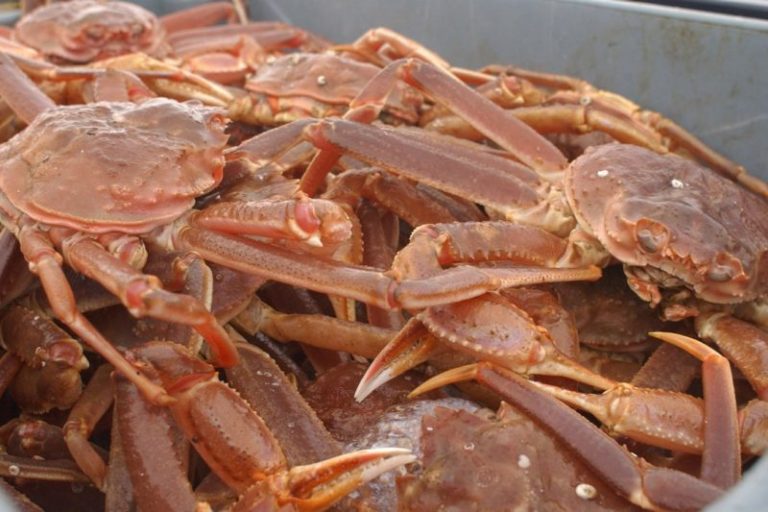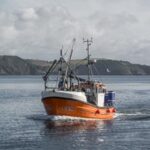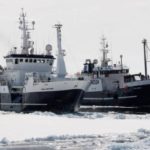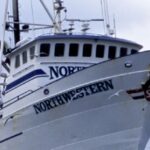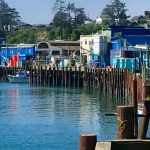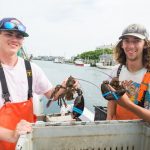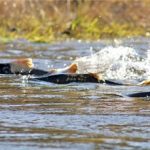Category Archives: Canada
FFAW Rotted with NL Liberal MPs’ Support for Return of Draggers
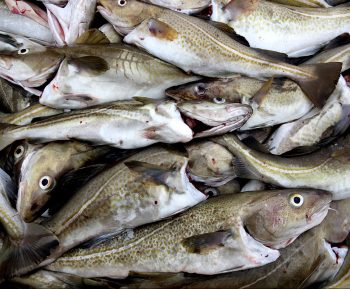 The FFAW says documents filed by Ottawa to defend reopening of a commercial cod fishery show all Liberal MPs supported the feds’ decision. The reopening once again gives local processors and NAFO countries access to the resource with offshore draggers, while the stock remains in the cautious zone. Pretty notes there was a promise for the first 115,000 metric tonnes of the 2J3KL northern cod quota to be allocated to inshore harvesters and Indigenous groups. He calls the actions of the six Liberal MPs — Gudie Hutchings, Seamus O’Regan, Joanne Thompson, Churence Rogers, Yvonne Jones, and Ken McDonald — “a total betrayal.” more, >>CLICK TO READ<< 07:01
The FFAW says documents filed by Ottawa to defend reopening of a commercial cod fishery show all Liberal MPs supported the feds’ decision. The reopening once again gives local processors and NAFO countries access to the resource with offshore draggers, while the stock remains in the cautious zone. Pretty notes there was a promise for the first 115,000 metric tonnes of the 2J3KL northern cod quota to be allocated to inshore harvesters and Indigenous groups. He calls the actions of the six Liberal MPs — Gudie Hutchings, Seamus O’Regan, Joanne Thompson, Churence Rogers, Yvonne Jones, and Ken McDonald — “a total betrayal.” more, >>CLICK TO READ<< 07:01
All NL MPs Supported Breaking Historical Agreement for Northern Cod, Injunction Documents Show
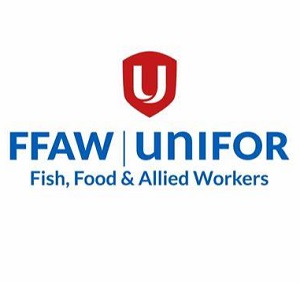 Documents submitted by the Government of Canada as part of the federal injunction filed by FFAW-Unifor in July show that all Liberal MPs in the province supported breaking the longstanding agreement on Northern cod to allow offshore draggers access while the stock remains in the cautious zone. “Documents are quickly coming in from DFO staffers via the federal court process. What we’ve seen thus far is a Liberal caucus of NL politicians who supported breaking the 40-plus year agreement to our province – and while it’s certainly not shocking at this point, it should be a real eye opener to the people of our province who elected these individuals to office,” says FFAW-Unifor Greg Pretty. more, >>CLICK TO READ<< 09:30
Documents submitted by the Government of Canada as part of the federal injunction filed by FFAW-Unifor in July show that all Liberal MPs in the province supported breaking the longstanding agreement on Northern cod to allow offshore draggers access while the stock remains in the cautious zone. “Documents are quickly coming in from DFO staffers via the federal court process. What we’ve seen thus far is a Liberal caucus of NL politicians who supported breaking the 40-plus year agreement to our province – and while it’s certainly not shocking at this point, it should be a real eye opener to the people of our province who elected these individuals to office,” says FFAW-Unifor Greg Pretty. more, >>CLICK TO READ<< 09:30
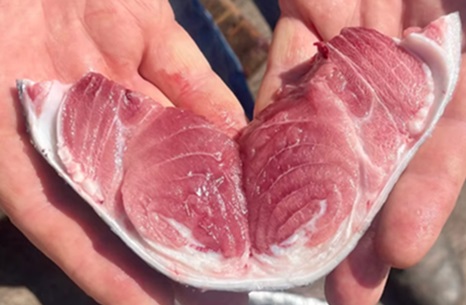
‘More fat, more flavour’: Why PEI tuna is selling at its highest price in decades
“We’re seeing prices range from $10 or $11 on the low side to $40, $50, $60 a pound on the high side. So these are higher prices than we’ve seen, probably since the early 90s,” said Jason Tompkins, owner of TNT Tuna in North Lake, which buys and exports about three-quarters of Canada’s bluefin tuna quota. Tompkins says in a normal season, just “one or two” of the roughly 1,500 tuna caught off the northeast coast of P.E.I. will earn the boat more than $10,000, after being sold on high-end markets around North America, Europe and Japan. So far this year? photos, more, >>CLICK TO READ<< 06:50
Athearn Marine Agency Boat of the Week: 44’x17′ Novi Lobster, Gillnetter, Scalloper
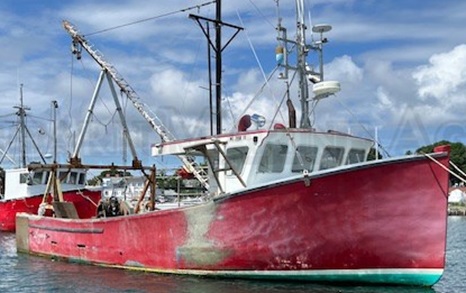 To review specifications, information, and 25 photos’, >click here< To see all the boats in this series, >click here< 06:25
To review specifications, information, and 25 photos’, >click here< To see all the boats in this series, >click here< 06:25
Newly reinstated Newfoundland cod fishery temporarily paused as landings hit limit
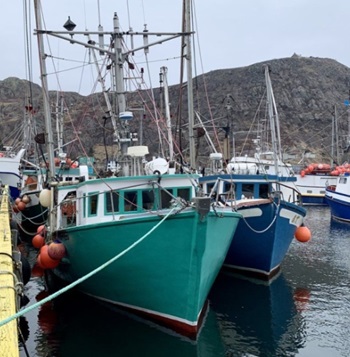 The federal government has temporarily paused parts of the newly reinstated commercial northern cod fishery off the east coast of Newfoundland as landings approach the seasonal limit. Fisheries and Oceans Canada says that as of Monday evening, fishers from the east coast of the island cannot fish cod until Sept. 15, when the second half of the season is set to begin. The first half of the season was set to end on Sept. 14, but officials say fishers have almost caught the maximum amount of fish allowed during that period. Labrador fishers will be confined to the region’s southeast coast until Sept. 15. more, >>CLICK TO READ<< 17:23
The federal government has temporarily paused parts of the newly reinstated commercial northern cod fishery off the east coast of Newfoundland as landings approach the seasonal limit. Fisheries and Oceans Canada says that as of Monday evening, fishers from the east coast of the island cannot fish cod until Sept. 15, when the second half of the season is set to begin. The first half of the season was set to end on Sept. 14, but officials say fishers have almost caught the maximum amount of fish allowed during that period. Labrador fishers will be confined to the region’s southeast coast until Sept. 15. more, >>CLICK TO READ<< 17:23
Organized crime linked to illegal lobster fishing ‘terrorizing the community,’ N.S. minister claims
 Nova Scotia’s fisheries minister says the federal failure to stop what he calls illegal out-of-season fishing in some of the most lucrative lobster grounds in the country has fuelled organized crime that is “terrorizing the community” along a stretch of the province’s southwest. Kent Smith made the comments in a letter last week to his federal counterpart, Fisheries Minister Diane Lebouthillier, in which he claims the illegal fishery has “entrenched itself” in the region of Clare and surrounding areas. “This is not related to Indigenous harvesting,” Smith said. “This is illegal lobster fishing that is causing havoc on the ground down there, causing havoc in the community and causing a lot of fear and anxiety in Clare and Meteghan.” more, >>CLICK TO READ<< 15:50
Nova Scotia’s fisheries minister says the federal failure to stop what he calls illegal out-of-season fishing in some of the most lucrative lobster grounds in the country has fuelled organized crime that is “terrorizing the community” along a stretch of the province’s southwest. Kent Smith made the comments in a letter last week to his federal counterpart, Fisheries Minister Diane Lebouthillier, in which he claims the illegal fishery has “entrenched itself” in the region of Clare and surrounding areas. “This is not related to Indigenous harvesting,” Smith said. “This is illegal lobster fishing that is causing havoc on the ground down there, causing havoc in the community and causing a lot of fear and anxiety in Clare and Meteghan.” more, >>CLICK TO READ<< 15:50
FFAW-Unifor Blames Federal Government for Shortened NL Cod Fishery Season
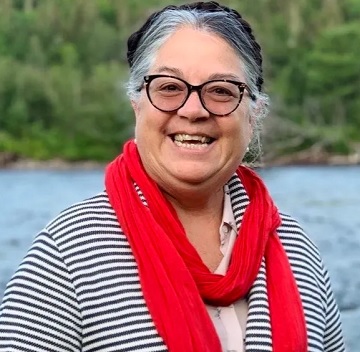 The Union that represents commercial fish harvesters in Newfoundland and Labrador is calling out the federal government for continued mismanagement of fisheries. This time, the criticism is again directed at the northern cod fishery in 3KL, which has been cut short after just a month of being open. With a closure taking place today, many harvesters found themselves with just a few days of fishing this season. “Federal MPs and Ministers like Diane Lebouthillier, Gudie Hutchings, and Seamus O’Regan are all responsible for the mass, premature layoff during what should be a booming season for our province,” says FFAW-Unifor President Greg Pretty. more, >>CLICK TO READ<< 08:12
The Union that represents commercial fish harvesters in Newfoundland and Labrador is calling out the federal government for continued mismanagement of fisheries. This time, the criticism is again directed at the northern cod fishery in 3KL, which has been cut short after just a month of being open. With a closure taking place today, many harvesters found themselves with just a few days of fishing this season. “Federal MPs and Ministers like Diane Lebouthillier, Gudie Hutchings, and Seamus O’Regan are all responsible for the mass, premature layoff during what should be a booming season for our province,” says FFAW-Unifor President Greg Pretty. more, >>CLICK TO READ<< 08:12
Review of prosecutions in chaotic elver fishery finds cases are being pursued
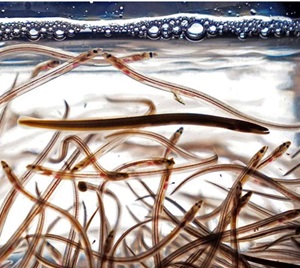 An internal review into whether federal Crown attorneys are refusing to prosecute infractions related to the turbulent baby eel fishery in the Maritimes has reportedly determined that proper discretion is being used and suggests at least two dozen cases have been brought to court. The examination was launched following a formal complaint by a commercial licence holder who alleged the Public Prosecution Service of Canada was failing to prosecute cases involving the unauthorized fishing of the juvenile eels, also known as elvers. In a recent email to the licence holder, David Antonyshyn, the deputy director of prosecutions, said an examination of 70 elver files referred by fisheries officers over a four-year period found about half proceeded to or were approved for prosecution. Others are still under review, while the remainder were declined. “There was not (and there is still not) any blanket policy not to prosecute particular individuals, or not to proceed with any particular type of offence,” Antonyshyn said in the email. more, >>CLICK TO READ<< 15:25
An internal review into whether federal Crown attorneys are refusing to prosecute infractions related to the turbulent baby eel fishery in the Maritimes has reportedly determined that proper discretion is being used and suggests at least two dozen cases have been brought to court. The examination was launched following a formal complaint by a commercial licence holder who alleged the Public Prosecution Service of Canada was failing to prosecute cases involving the unauthorized fishing of the juvenile eels, also known as elvers. In a recent email to the licence holder, David Antonyshyn, the deputy director of prosecutions, said an examination of 70 elver files referred by fisheries officers over a four-year period found about half proceeded to or were approved for prosecution. Others are still under review, while the remainder were declined. “There was not (and there is still not) any blanket policy not to prosecute particular individuals, or not to proceed with any particular type of offence,” Antonyshyn said in the email. more, >>CLICK TO READ<< 15:25
Lobster group files legal action over moderate livelihood fishery
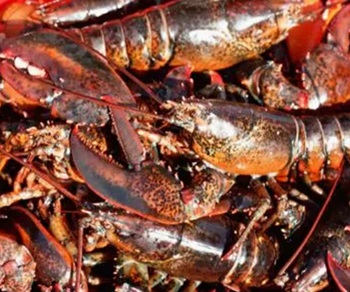 A lobster conservation group in southwestern Nova Scotia is taking legal action against Ottawa and the Sipekne’katik First Nation over out of season fishing. The Unified Fisheries Conservation Alliance (UFCA) filed a notice of action in Supreme Court in an effort to declare the summer fishery illegal. “The Supreme Court of Canada introduced the concept of a moderate livelihood fishery via the Marshall decisions but has never adequately defined the scope and limits that should apply,” said Michel Samson, counsel with the law firm Cox & Palmer. “This has created confusion between the DFO and the Public Prosecution Service as to what laws to enforce. It is imperative that our courts provide the rules and clarity required for both the commercial fishery and for First Nation communities.” more, >>CLICK TO READ<< 13:05
A lobster conservation group in southwestern Nova Scotia is taking legal action against Ottawa and the Sipekne’katik First Nation over out of season fishing. The Unified Fisheries Conservation Alliance (UFCA) filed a notice of action in Supreme Court in an effort to declare the summer fishery illegal. “The Supreme Court of Canada introduced the concept of a moderate livelihood fishery via the Marshall decisions but has never adequately defined the scope and limits that should apply,” said Michel Samson, counsel with the law firm Cox & Palmer. “This has created confusion between the DFO and the Public Prosecution Service as to what laws to enforce. It is imperative that our courts provide the rules and clarity required for both the commercial fishery and for First Nation communities.” more, >>CLICK TO READ<< 13:05
DFO: Some fishery officers refusing work in N.S., citing dangerous conditions
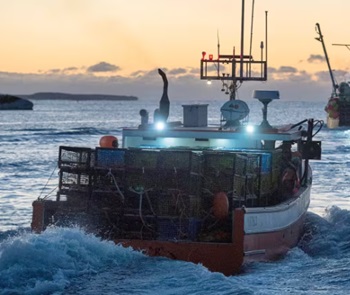 Some fishery officers with Fisheries and Oceans Canada are refusing work in Nova Scotia out of concern for their safety, the federal department said Thursday. While DFO said in a statement it is “making every effort to minimize operational impacts,” a group representing fishermen in southwest Nova Scotia said enforcement officers are nowhere to be seen to prevent illegal fishing during the off-season. “There’s illegal fishing occurring and there is no enforcement staff on the road or on the water or on the wharfs. And it’s out of hand,” Dan Fleck, executive director of the Brazil Rock Lobster Association, more, >>CLICK TO READ<< 20:33
Some fishery officers with Fisheries and Oceans Canada are refusing work in Nova Scotia out of concern for their safety, the federal department said Thursday. While DFO said in a statement it is “making every effort to minimize operational impacts,” a group representing fishermen in southwest Nova Scotia said enforcement officers are nowhere to be seen to prevent illegal fishing during the off-season. “There’s illegal fishing occurring and there is no enforcement staff on the road or on the water or on the wharfs. And it’s out of hand,” Dan Fleck, executive director of the Brazil Rock Lobster Association, more, >>CLICK TO READ<< 20:33
Canadian government to build conservation hatchery in Prince George to boost Chinook and sockeye salmon recovery
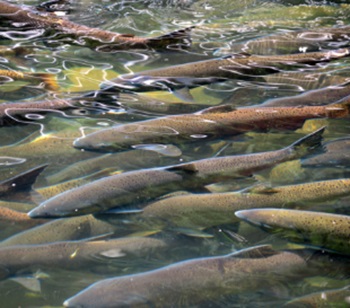 The Canadian federal government has announced plans to build a new Pacific salmon hatchery in Prince George, British Columbia (B.C.). This initiative, supported by the Pacific Salmon Strategy Initiative (PSSI), aims to bolster the conservation and recovery of wild Chinook and sockeye salmon populations. Operated by Fisheries and Oceans Canada (DFO) in partnership with the Lheidli T’enneh First Nation and Canfor Pulp Ltd., the hatchery will be constructed this fall on federal land along the Nechako River, near its junction with the Fraser River. “As a Nation, fisheries are central to the work we do,” said Chief Dolleen Logan, on behalf of Lheidli T’enneh First Nation. “We remain committed to maintaining biodiversity in our traditional territory while enhancing salmon populations throughout the region.” more, >>CLICK TO READ<< 13:02
The Canadian federal government has announced plans to build a new Pacific salmon hatchery in Prince George, British Columbia (B.C.). This initiative, supported by the Pacific Salmon Strategy Initiative (PSSI), aims to bolster the conservation and recovery of wild Chinook and sockeye salmon populations. Operated by Fisheries and Oceans Canada (DFO) in partnership with the Lheidli T’enneh First Nation and Canfor Pulp Ltd., the hatchery will be constructed this fall on federal land along the Nechako River, near its junction with the Fraser River. “As a Nation, fisheries are central to the work we do,” said Chief Dolleen Logan, on behalf of Lheidli T’enneh First Nation. “We remain committed to maintaining biodiversity in our traditional territory while enhancing salmon populations throughout the region.” more, >>CLICK TO READ<< 13:02
N.B. fishermen test new gear in bid to stay on the water when right whales spotted
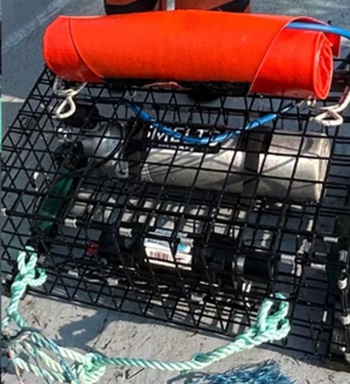 As of Aug. 13, fishermen in New Brunswick were forced to pull their traps and stop fishing on 35 separate occasions this year after North Atlantic right whales were spotted. But a new pilot program in the southwest is trying to keep lobster and crab boats on the water. Crab fisherman Greg Beckerton and two lobster fishermen, Judson Mitchell and Peter Mawhinney, are testing five new types of ropeless gear, with the goal of choosing two for a wider test in the spring. Beckerton hopes that alternative fishing gear that limits the use of traditional rope will allow fishing to continue when whales are in the area. “In a closed-area situation we could use this gear, and it would definitely be an advantage,” he said. Photos, more, >>CLICK TO READ<< 09:31
As of Aug. 13, fishermen in New Brunswick were forced to pull their traps and stop fishing on 35 separate occasions this year after North Atlantic right whales were spotted. But a new pilot program in the southwest is trying to keep lobster and crab boats on the water. Crab fisherman Greg Beckerton and two lobster fishermen, Judson Mitchell and Peter Mawhinney, are testing five new types of ropeless gear, with the goal of choosing two for a wider test in the spring. Beckerton hopes that alternative fishing gear that limits the use of traditional rope will allow fishing to continue when whales are in the area. “In a closed-area situation we could use this gear, and it would definitely be an advantage,” he said. Photos, more, >>CLICK TO READ<< 09:31
N.S. Liberals call for new task force to improve enforcement of lobster fishery
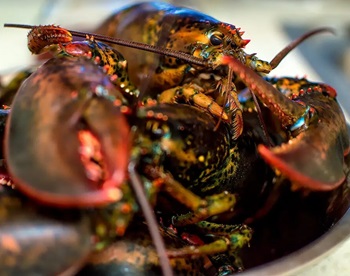 As top fishery officials from around the country arrive in PEI for the Canadian Council of Fisheries and Aquaculture Ministers meeting Nova Scotia’s Liberals are calling for a solution to the ongoing disputes over lobster fishing. Particularly in southwest Nova Scotia tensions have been running high with indigenous lobster fishermen and commercial operators. The Indigenous fishers have a right to a moderate livelihood fishery which was upheld by the Supreme Court. While commercial fishers argue that they need to still observe fishing seasons for the overall health of the lobster fishery. At times the altercations have become violent, which the Liberals say will only continue if things go unchanged. more, >>CLICK TO READ<< 07:42
As top fishery officials from around the country arrive in PEI for the Canadian Council of Fisheries and Aquaculture Ministers meeting Nova Scotia’s Liberals are calling for a solution to the ongoing disputes over lobster fishing. Particularly in southwest Nova Scotia tensions have been running high with indigenous lobster fishermen and commercial operators. The Indigenous fishers have a right to a moderate livelihood fishery which was upheld by the Supreme Court. While commercial fishers argue that they need to still observe fishing seasons for the overall health of the lobster fishery. At times the altercations have become violent, which the Liberals say will only continue if things go unchanged. more, >>CLICK TO READ<< 07:42
Lobster fishermen say tiny change in legal sizes could disrupt imperiled industry
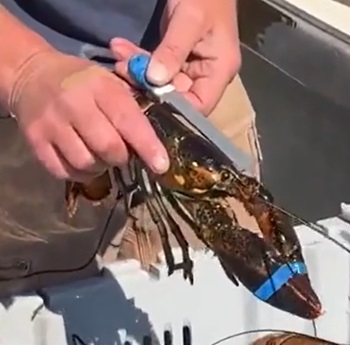 Gerry Cushman has seen Maine’s iconic lobster industry survive numerous threats in his three decades on the water, but the latest challenge, which might sound tiny, could be the biggest one yet. Lobster fishing is a game of inches, and the number of inches is about to change. Fishing regulators are instituting a new rule that lobster fishermen must abide by stricter minimum sizes for crustaceans they harvest. In addition to causing a dispute between fishermen and regulators, the change has led to confusion about the ramifications for international trade in one of the world’s most popular seafoods. “We don’t need any more, really, on our plate. It’s just a lot going on, one fight after another,” Cushman, 55, a boat captain who fishes out of Port Clyde, said. “We don’t need anything in the marketplace to lower the price of lobsters.” more, >>CLICK TO READ<< 09:59
Gerry Cushman has seen Maine’s iconic lobster industry survive numerous threats in his three decades on the water, but the latest challenge, which might sound tiny, could be the biggest one yet. Lobster fishing is a game of inches, and the number of inches is about to change. Fishing regulators are instituting a new rule that lobster fishermen must abide by stricter minimum sizes for crustaceans they harvest. In addition to causing a dispute between fishermen and regulators, the change has led to confusion about the ramifications for international trade in one of the world’s most popular seafoods. “We don’t need any more, really, on our plate. It’s just a lot going on, one fight after another,” Cushman, 55, a boat captain who fishes out of Port Clyde, said. “We don’t need anything in the marketplace to lower the price of lobsters.” more, >>CLICK TO READ<< 09:59
Lobster fishery set for reprieve on size limits
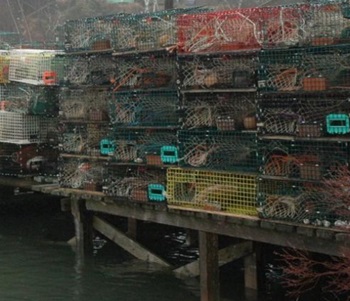 A second delay to implementing minimum gauge and vent sizes for lobsters caught in the Gulf of Maine, Georges Bank and Outer Cape Cod was initiated last week by the American Lobster Board, which operates under the Atlantic States Marine Fisheries Commission (ASMFC), a measure that Maine lobstermen, and Congressman Jared Golden, have hoped and pushed for. The new implementation date would be July 1, 2025, if the measure is adopted by the ASMFC’s American Lobster Board. An earlier delay the ASMFC approved had pushed back to Jan. 1, 2025, the new gauge and escape vent sizes in lobster traps for commercial lobster fisheries in the targeted lobster management areas. When the measure was first approved, it was to take effect based on a “trigger” mechanism. more, >>CLICK TO READ<< 12:52
A second delay to implementing minimum gauge and vent sizes for lobsters caught in the Gulf of Maine, Georges Bank and Outer Cape Cod was initiated last week by the American Lobster Board, which operates under the Atlantic States Marine Fisheries Commission (ASMFC), a measure that Maine lobstermen, and Congressman Jared Golden, have hoped and pushed for. The new implementation date would be July 1, 2025, if the measure is adopted by the ASMFC’s American Lobster Board. An earlier delay the ASMFC approved had pushed back to Jan. 1, 2025, the new gauge and escape vent sizes in lobster traps for commercial lobster fisheries in the targeted lobster management areas. When the measure was first approved, it was to take effect based on a “trigger” mechanism. more, >>CLICK TO READ<< 12:52
Commercial fishers demand stricter enforcement and penalties for illegal lobster sales – Federal and provincial governments need to step-up enforcement
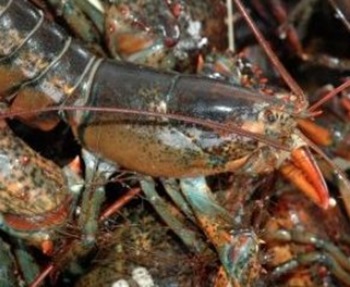 Uncertainty on the future of the commercial fishery will potentially put the sustainability of the lobster catch and jobs at risk according to the leaders of the Coalition of Atlantic and Quebec Fishing Organizations and the Unified Fisheries Conservation Alliance (UFCA). The upcoming meeting of fisheries ministers from across Canada is a unique opportunity to make sure the commercial fishery remains sustainable. Action is needed from both federal and provincial officials. For the Government of Canada, keeping independent enforcement officers on the water is critical to making sure no one fishes out of season. “Enforcing one set of rules for everyone is the key to a strong fishery. Impartial, independent enforcement officers at Department of Fisheries and Oceans is at the heart of a sustainable fishery,” according to Gordon Beaton, president of the Gulf Nova Scotia Fleet Planning Board. “We are concerned about potential changes to enforcement, we need more, not less, independent enforcement of the rules.” Science, not politics, should be driving decisions on the fishery. more, >>CLICK TO READ<< 17:40
Uncertainty on the future of the commercial fishery will potentially put the sustainability of the lobster catch and jobs at risk according to the leaders of the Coalition of Atlantic and Quebec Fishing Organizations and the Unified Fisheries Conservation Alliance (UFCA). The upcoming meeting of fisheries ministers from across Canada is a unique opportunity to make sure the commercial fishery remains sustainable. Action is needed from both federal and provincial officials. For the Government of Canada, keeping independent enforcement officers on the water is critical to making sure no one fishes out of season. “Enforcing one set of rules for everyone is the key to a strong fishery. Impartial, independent enforcement officers at Department of Fisheries and Oceans is at the heart of a sustainable fishery,” according to Gordon Beaton, president of the Gulf Nova Scotia Fleet Planning Board. “We are concerned about potential changes to enforcement, we need more, not less, independent enforcement of the rules.” Science, not politics, should be driving decisions on the fishery. more, >>CLICK TO READ<< 17:40
NAFO Moving Forward with Offshore Dragger Access Despite Legal Injunction and Historical Agreement for Northern Cod
 Despite vocal opposition from industry and environmental groups, the North Atlantic Fisheries Organization (NAFO) is making strides towards allowing international and domestic offshore draggers back on the Northern cod grounds as early as this fall. The European Union (EU) is awaiting approval of their harvesting proposal from the NAFO Commission to get access to the fishery. “It is our strong opinion that the NAFO Commission should defer reopening the offshore allocation for the 2J3KL northern cod fishery. The reopening of the commercial cod fishery was done under poor faith by Minister Lebouthillier and Prime Minster Justin Trudeau; with both went against the advice of science, environment and industry, and also broke a four-decade commitment to our province,” says Pretty. “By lifting the 32-year moratorium on commercial fishing on June 26, 2024, the Government of Canada is further corporatizing public resources, limiting the economic sustainability of coastal communities, and breaking a decades long promise to the province of Newfoundland and Labrador,” Pretty explains. more, >>CLICK TO READ<<07:50
Despite vocal opposition from industry and environmental groups, the North Atlantic Fisheries Organization (NAFO) is making strides towards allowing international and domestic offshore draggers back on the Northern cod grounds as early as this fall. The European Union (EU) is awaiting approval of their harvesting proposal from the NAFO Commission to get access to the fishery. “It is our strong opinion that the NAFO Commission should defer reopening the offshore allocation for the 2J3KL northern cod fishery. The reopening of the commercial cod fishery was done under poor faith by Minister Lebouthillier and Prime Minster Justin Trudeau; with both went against the advice of science, environment and industry, and also broke a four-decade commitment to our province,” says Pretty. “By lifting the 32-year moratorium on commercial fishing on June 26, 2024, the Government of Canada is further corporatizing public resources, limiting the economic sustainability of coastal communities, and breaking a decades long promise to the province of Newfoundland and Labrador,” Pretty explains. more, >>CLICK TO READ<<07:50
B.C. commercial fisherman fined $33K for harvesting catch in unique reefs
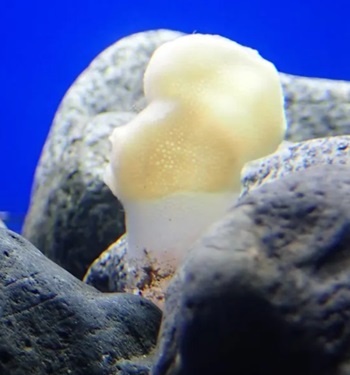 The owner of a commercial halibut vessel in British Columbia received more than $33,000 in fines for fishing in a marine protected area containing glass sponge reefs unique to the waters of the Pacific Northwest. Fisheries and Oceans Canada says a provincial court judge handed down the fine in May to Brent Belveal, who pleaded guilty to offences under the Fisheries Act. It says Belveal, operator of the vessel Gypsy Soul, harvested and sold his illegal catch from within the Queen Charlotte Sound Glass Sponge Reef Marine Protected Area near Bella Bella off B.C.’s central coast. The department describes the reefs as “globally unique ecosystems.” more, >>CLICK TO READ<< 10:39
The owner of a commercial halibut vessel in British Columbia received more than $33,000 in fines for fishing in a marine protected area containing glass sponge reefs unique to the waters of the Pacific Northwest. Fisheries and Oceans Canada says a provincial court judge handed down the fine in May to Brent Belveal, who pleaded guilty to offences under the Fisheries Act. It says Belveal, operator of the vessel Gypsy Soul, harvested and sold his illegal catch from within the Queen Charlotte Sound Glass Sponge Reef Marine Protected Area near Bella Bella off B.C.’s central coast. The department describes the reefs as “globally unique ecosystems.” more, >>CLICK TO READ<< 10:39
Gulf of Maine lobsters are experiencing a housing crisis
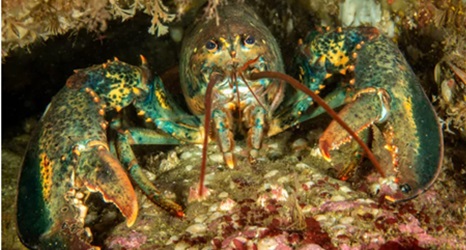 Lobster fishing has been a good business in the Gulf of Maine for a long time. With the exception of a few notable dips, both the landings and value of the catch have been on an upward swing for decades. Between 1984 and 2014, the lobster population in the Gulf of Maine jumped an estimated 515 percent, while simultaneously declining by 78 percent in southern New England as the water warmed in both regions. While it’s started to decline in recent years, numbers are still far higher than they were several decades ago. The result? A lobster housing crisis. “The warming sea temperatures have actually created a real sweet spot for lobster reproduction,” said Brian Skerry, a National Geographic photographer and producer on the recent GBH/PBS series Sea Change, which explores the impact of climate change on the Gulf of Maine. more, >>CLICK TO READ<< 17:51
Lobster fishing has been a good business in the Gulf of Maine for a long time. With the exception of a few notable dips, both the landings and value of the catch have been on an upward swing for decades. Between 1984 and 2014, the lobster population in the Gulf of Maine jumped an estimated 515 percent, while simultaneously declining by 78 percent in southern New England as the water warmed in both regions. While it’s started to decline in recent years, numbers are still far higher than they were several decades ago. The result? A lobster housing crisis. “The warming sea temperatures have actually created a real sweet spot for lobster reproduction,” said Brian Skerry, a National Geographic photographer and producer on the recent GBH/PBS series Sea Change, which explores the impact of climate change on the Gulf of Maine. more, >>CLICK TO READ<< 17:51
Lobster’s nightmare: Vicious Atlantic wolffish is one scary catch in the Gulf of Maine
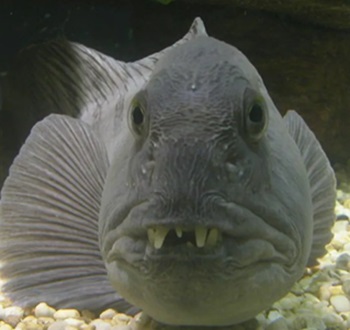 Atlantic wolffish are vicious looking. Their head is huge with gaping teeth that protrude from their lips both top and bottom, giving them a severe overbite. Their tail is tapered with long dorsal and anal fins, which give it a look of an eel. Beware to anyone trying to get a hook out of their mouth! These fish enjoy cold water and can be found throughout the Gulf of Maine to Labrador and down to the Great South Channel of Georges Bank in New England. Amazingly, they can survive in some of the coldest water by producing “antifreeze” proteins stored in their blood and livers. This keeps their blood from freezing under extreme conditions. Around age 5-6, they reach maturity and begin mating. It appears that wolffish are solitary animals except during the mating season, according to NOAA, which occurs in the Gulf of Maine during the fall. The wolffish find mates and remain together until the female lays her eggs. Lobsters beware! The teeth of the wolffish allow them to eat and crush almost anything they want, and what they want are lobsters. They have several rows of very sharp teeth. My husband, always a biologist, when he was fishing commercially regularly dissected the fish he caught to see what they had been eating. Twenty years ago, he opened a 20-pound wolffish and found 21 lobster tails and more body parts in its stomach! more, >>CLICK TO READ<< 14:20
Atlantic wolffish are vicious looking. Their head is huge with gaping teeth that protrude from their lips both top and bottom, giving them a severe overbite. Their tail is tapered with long dorsal and anal fins, which give it a look of an eel. Beware to anyone trying to get a hook out of their mouth! These fish enjoy cold water and can be found throughout the Gulf of Maine to Labrador and down to the Great South Channel of Georges Bank in New England. Amazingly, they can survive in some of the coldest water by producing “antifreeze” proteins stored in their blood and livers. This keeps their blood from freezing under extreme conditions. Around age 5-6, they reach maturity and begin mating. It appears that wolffish are solitary animals except during the mating season, according to NOAA, which occurs in the Gulf of Maine during the fall. The wolffish find mates and remain together until the female lays her eggs. Lobsters beware! The teeth of the wolffish allow them to eat and crush almost anything they want, and what they want are lobsters. They have several rows of very sharp teeth. My husband, always a biologist, when he was fishing commercially regularly dissected the fish he caught to see what they had been eating. Twenty years ago, he opened a 20-pound wolffish and found 21 lobster tails and more body parts in its stomach! more, >>CLICK TO READ<< 14:20
As Europe reviews its rules on seal products, Canada calls for easing of restrictions
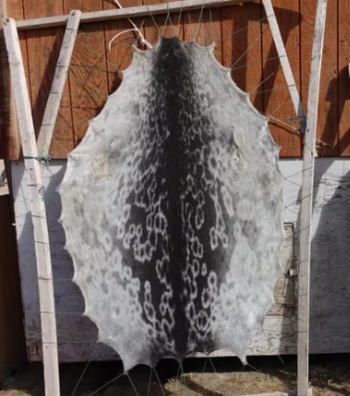 The Canadian government is calling on the European Union to ease restrictions on seal products as member states review trade regulations. Ottawa said in a letter dated Tuesday to the European Commission’s vice-president that Canada has been given the opportunity to “provide input” on the seal trade while the union fine tunes its rules. The outcome is scheduled to be published on the site in eight weeks. In 2009, the European Union limited imports for Canadian seal products, citing the “pain, distress, fear and other forms of suffering” of seals because of the way in which they are killed and skinned. Canada has many species of seals including bearded, grey, harbour, harp, hooded and ringed. Three of these — grey, harp, and hooded — are killed for commercial uses. more, >>CLICK TO READ<< 10:44
The Canadian government is calling on the European Union to ease restrictions on seal products as member states review trade regulations. Ottawa said in a letter dated Tuesday to the European Commission’s vice-president that Canada has been given the opportunity to “provide input” on the seal trade while the union fine tunes its rules. The outcome is scheduled to be published on the site in eight weeks. In 2009, the European Union limited imports for Canadian seal products, citing the “pain, distress, fear and other forms of suffering” of seals because of the way in which they are killed and skinned. Canada has many species of seals including bearded, grey, harbour, harp, hooded and ringed. Three of these — grey, harp, and hooded — are killed for commercial uses. more, >>CLICK TO READ<< 10:44
New regulations on lobstering delayed amid pushback from Seacoast lobstermen
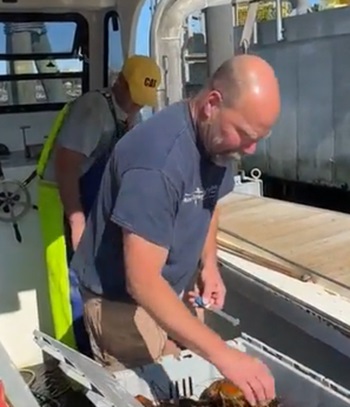 New federal regulations on the lobstering industry are being delayed after months of pushback from local lobstermen. The rules would increase the minimum acceptable size for lobsters that can be caught and require bigger escape vents to be added to traps. Regulators with the Atlantic States Marine Fisheries Commission told News9 the goal of the new rules, laid out in policy called Addendum 27, are aimed at protecting the population of younger lobsters and allowing them to grow to a size where they can reproduce and be suitable for harvesting. Starks said the number of those younger lobsters have declined in research counts in recent years, triggering the new regulations. However, local lobstermen have cast doubt on those studies and railed against the rules laid out in Addendum 27. Video, more, >>CLICK TO READ<< 11:18
New federal regulations on the lobstering industry are being delayed after months of pushback from local lobstermen. The rules would increase the minimum acceptable size for lobsters that can be caught and require bigger escape vents to be added to traps. Regulators with the Atlantic States Marine Fisheries Commission told News9 the goal of the new rules, laid out in policy called Addendum 27, are aimed at protecting the population of younger lobsters and allowing them to grow to a size where they can reproduce and be suitable for harvesting. Starks said the number of those younger lobsters have declined in research counts in recent years, triggering the new regulations. However, local lobstermen have cast doubt on those studies and railed against the rules laid out in Addendum 27. Video, more, >>CLICK TO READ<< 11:18
Fishers excited as opening of fall lobster season arrives
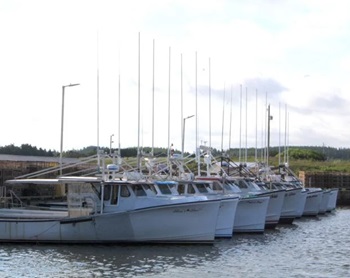 As the fall lobster season approaches, fishers in LFA 25 are looking forward to hitting the waves. “It’s always a challenge,” said Kristian Bernard, who fishes out of Skinners Pond. “You’ve always got to try and do your best at what you can catch, and it’s nice to be on the water.” This year, fishers will be starting earlier than what was originally planned, something that hasn’t received much complaint. “Everybody was really pushing for earlier because of bad weather at the end of the season,” said Travis Shea, who also fishes out of Skinners Pond. “Due to weather, the last few seasons, we’ve all been pushed back a few days extra, so we’re trying to get a bit of leeway.” more, >>CLICK TO READ<< 07:55
As the fall lobster season approaches, fishers in LFA 25 are looking forward to hitting the waves. “It’s always a challenge,” said Kristian Bernard, who fishes out of Skinners Pond. “You’ve always got to try and do your best at what you can catch, and it’s nice to be on the water.” This year, fishers will be starting earlier than what was originally planned, something that hasn’t received much complaint. “Everybody was really pushing for earlier because of bad weather at the end of the season,” said Travis Shea, who also fishes out of Skinners Pond. “Due to weather, the last few seasons, we’ve all been pushed back a few days extra, so we’re trying to get a bit of leeway.” more, >>CLICK TO READ<< 07:55
N.S. swordfish harpoon fleet urged to bring tourists aboard to boost troubled sector
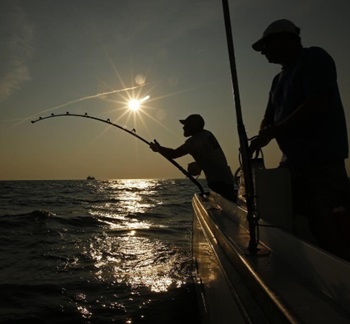 An environmental group says Nova Scotia’s commercial swordfish fleet could generate millions in added revenue by bringing tourists along for fishing trips and using different gear. The Ecology Action Centre says swordfish harpooning — lunging a long spear into the water to catch a fish — has become increasingly difficult and less economically viable because swordfish are appearing less often at the surface due to changing water conditions. In a report released Wednesday, the centre says changing ocean conditions are preventing fishers who use the traditional fishing method from fulfilling their already small swordfish quotas. The group’s solution is for the harpoon fleet to start using a single deepwater hook and line — called rod and reel gear — and to charge tourists to come aboard for a “once-in-a-lifetime experience.” more, >>CLICK TO READ<< 18:49
An environmental group says Nova Scotia’s commercial swordfish fleet could generate millions in added revenue by bringing tourists along for fishing trips and using different gear. The Ecology Action Centre says swordfish harpooning — lunging a long spear into the water to catch a fish — has become increasingly difficult and less economically viable because swordfish are appearing less often at the surface due to changing water conditions. In a report released Wednesday, the centre says changing ocean conditions are preventing fishers who use the traditional fishing method from fulfilling their already small swordfish quotas. The group’s solution is for the harpoon fleet to start using a single deepwater hook and line — called rod and reel gear — and to charge tourists to come aboard for a “once-in-a-lifetime experience.” more, >>CLICK TO READ<< 18:49
FFAW celebrating decision against seafood processors in snow crab dispute
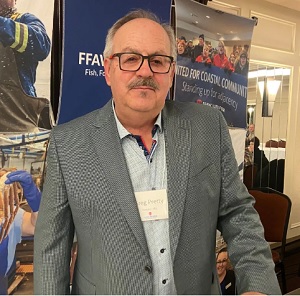 The Fish, Food and Allied Workers union is celebrating a ruling over last year’s payment dispute for snow crab that the union president estimates will net a collective $3.3 million payout for harvesters. FFAW filed the grievance against the Association of Seafood Producers (ASP) on the removal of the 20 per cent tolerance for snow crab in 2023. The tolerance had previously allowed harvesters to be paid the minimum price for their entire catch as long as the percentage of crab under four inches, but still of legal size, was less than 20 per cent. On Aug. 5 the arbiter ruled in favour of the fish harvesters union. “These processors have processing licenses from the province, and I expect them to behave in a more honourable manner than what they’ve been doing,” FFAW president Greg Pretty told CBC News. “It’s important not only that the harvesters get their money back, but that it shines a light on behaviours of crab processing companies in this province.” He said fish harvesters are owed approximately $3.3 million from 2023 from processing companies. more, >>CLICK TO READ<< 14:19
The Fish, Food and Allied Workers union is celebrating a ruling over last year’s payment dispute for snow crab that the union president estimates will net a collective $3.3 million payout for harvesters. FFAW filed the grievance against the Association of Seafood Producers (ASP) on the removal of the 20 per cent tolerance for snow crab in 2023. The tolerance had previously allowed harvesters to be paid the minimum price for their entire catch as long as the percentage of crab under four inches, but still of legal size, was less than 20 per cent. On Aug. 5 the arbiter ruled in favour of the fish harvesters union. “These processors have processing licenses from the province, and I expect them to behave in a more honourable manner than what they’ve been doing,” FFAW president Greg Pretty told CBC News. “It’s important not only that the harvesters get their money back, but that it shines a light on behaviours of crab processing companies in this province.” He said fish harvesters are owed approximately $3.3 million from 2023 from processing companies. more, >>CLICK TO READ<< 14:19
Lawsuit alleges Cooke Aquaculture using shell companies to skirt U.S. law
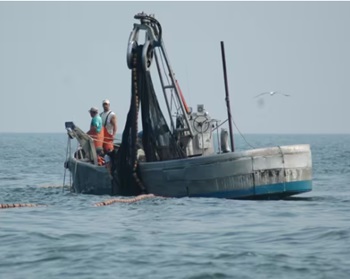 Cooke Aquaculture, one of New Brunswick’s largest companies, has asked for dismissal of a U.S. lawsuit accusing it of using a complex web of shell companies to break anti-foreign ownership laws. Saint John-based Cooke Aquaculture has owned Omega Protein, in Virginia, since 2017. Omega is affiliated with another company that operates a Chesapeake Bay menhaden fishery, a small baitfish used to make fishmeal, fish oil and other products. The menhaden fishery under Omega has concerned environmental activists, who say the company is overfishing a fish that many species up the food chain depend on in the Chesapeake Bay, which is slightly smaller than the Bay of Fundy. The lawsuit alleges Cooke is violating the American Fisheries Act, which requires 75 per cent of a company fishing in the U.S. to be owned by a U.S. citizen. more, >>CLICK TO READ<< 07:35
Cooke Aquaculture, one of New Brunswick’s largest companies, has asked for dismissal of a U.S. lawsuit accusing it of using a complex web of shell companies to break anti-foreign ownership laws. Saint John-based Cooke Aquaculture has owned Omega Protein, in Virginia, since 2017. Omega is affiliated with another company that operates a Chesapeake Bay menhaden fishery, a small baitfish used to make fishmeal, fish oil and other products. The menhaden fishery under Omega has concerned environmental activists, who say the company is overfishing a fish that many species up the food chain depend on in the Chesapeake Bay, which is slightly smaller than the Bay of Fundy. The lawsuit alleges Cooke is violating the American Fisheries Act, which requires 75 per cent of a company fishing in the U.S. to be owned by a U.S. citizen. more, >>CLICK TO READ<< 07:35






